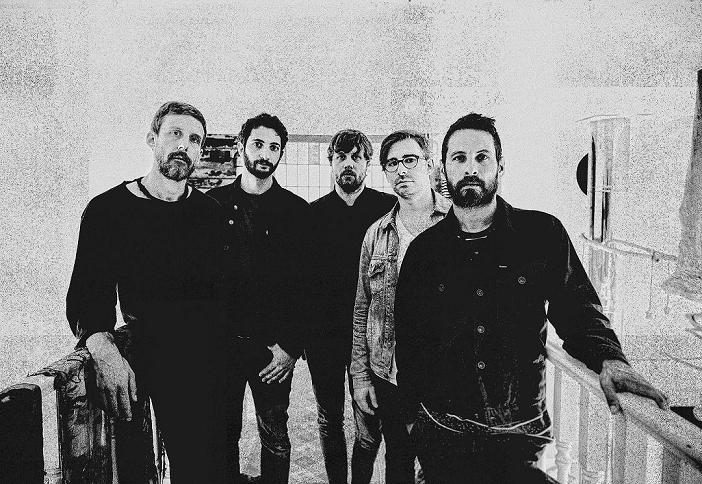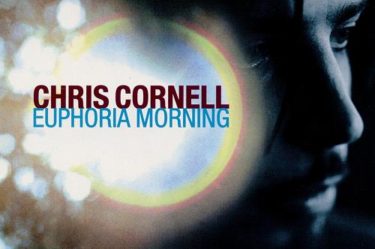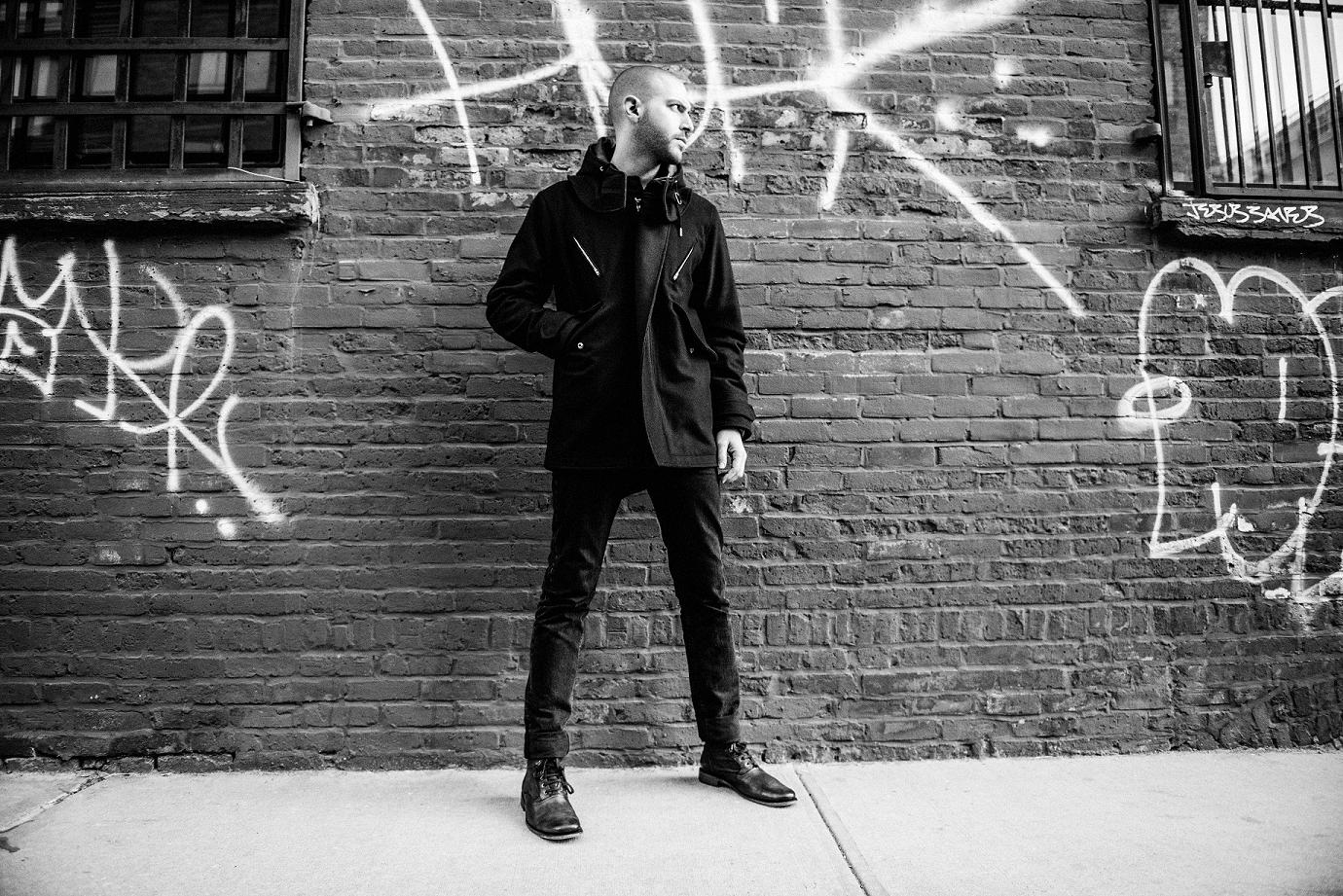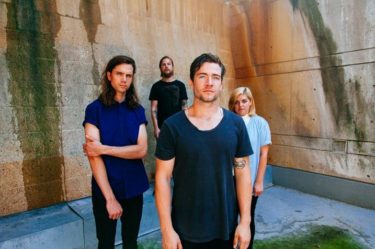Interview: Sam Roberts
You could say that Sam Roberts is an elemental songwriter. We spotted four references to fire in the 2016 Sam Roberts Band album TerraForm, but he insists he isn’t a pyromaniac (although he “might enjoy a campfire more than the next person”). The album title refers to the process of transforming a planet to resemble Earth, which is what we’ll have to do before we colonize Mars. The title track has a literal meaning, but as Roberts explains, there’s also a deeper metaphor: Sometimes we need to Terraform ourselves a bit. Elsewhere on the album, there are stories about trips to Hell, cosmic love triangles, and the challenges of family life.
The first single from TerraForm, “If You Want It,” has been dominating rock and alternative radio across Canada, but it’s nothing new for the Sam Roberts Band. Lead singer, guitarist and main songwriter Sam Roberts first made his mark when “Brother Down” from his 2002 EP The Inhuman Condition unexpectedly gained radio traction, and he’s been red hot ever since. In 2011, the word “Band” was officially added to the name to better capture what the dynamic of the group had always been: a collaborative effort between Dave Nugent (lead guitar), Eric Fares (keyboard/guitar), James Hall (bass), and Josh Trager (drums).
In this conversation, Roberts discusses the themes present on the new record, the recurring image of fire in their lyrics, and reflects on some of the band’s most well-known tunes.
Laura Antonelli (Songfacts): When you’re writing a song, what method usually results in the best outcome for you?
Sam Roberts: Oh, that’s changed a bit over the years. It really depends on an album-to-album basis. By the time I get maybe a couple of songs into a record, I’ve definitely developed a method that will apply to almost every song that comes out on that record.
It used to be sitting around my apartment with my 4-track and a recorder. I would strum away on an acoustic guitar, pick out a melody, and then write from a more acoustic-oriented perspective. But then I started making house music. French house music in Montreal was big in the 1990s. I had a drum machine. Everything started with a drum machine.
So I’ve tried to give every record its own kind of organic method. This record started with beats. The song would grow around the beats and there wouldn’t necessarily be any melody in mind or instrumentation at the time. Getting back to my French house roots, I would just sit there and start with beats and build it up from there. I would usually go to a bass line and then start tooling around with synthesizers.
Synthesizers are my new black hole. I basically end up writing everything that I can as soon as I get onto a synthesizer. So in this case, I got a new synth and just started seeing what sound it could make. By trying to explore how the synthesizer is working, you end up coming up with tons of things you probably wouldn’t have thought or come up with if you were consciously trying to write the song. So a lot of music just happens that way. It’s spontaneously following sounds you find compelling that you chase and see where they’re leading you.
Songfacts: You often put contrasting themes together, such as ugly and beautiful, dark and light, despair and hope. Why do you write that way lyrically?
Sam: I just like the tension between the two. I like the tension between deceptively uplifting instrumentation and a dark lyrical subject matter. You’re ultimately trying to resolve the two. I’m essentially a pretty optimistic person, but I try to let the opposites battle themselves out, and hopefully find some sort of redemption at the end of the song.
Songfacts: The title track from your new album TerraForm has a spacey-atmospheric sound. And you described it in an interview as being about “the wreckage of a planet.” Can you elaborate on that thought and what’s happening in the song?
Sam: Well, the actual title track “TerraForm” is leaving the waste of a planet that we’ve destroyed. We can obviously look at that in a literal way in terms in how we treat the one planet that we have with such utter disrespect. It could be a not-too-distant look at what we’ve done to Earth and how if humanity is to continue forward, we’d have to go and find another place. So that’s the whole scientific side of things and the act of terraforming or going to another planet such as Mars or some other rock in space, and making it liveable for human beings. I think that’s the more literal or surface level of the song.
In writing that song, it was also about your life as being its own world and how sometimes we break up some of the fundamental pieces of our own lives, whether in the long plotline or whether on the daily basis. We have a tendency toward self-destructiveness that we have to find a way out of and we have to be willing to leave behind. So the whole act of terraforming is part of making your own life liveable and finding redemption and reinvention in your own life.
Songfacts: You said that the first single from TerraForm, “If You Want It,” was “born out of a fear of Satan.”
Sam: [Laughs] I’m Catholic. All Catholics are afraid of Satan.
Songfacts: Can you expand on that and what’s occurring in that one?
Sam: Well, I wasn’t intentionally trying to talk about Hell, but I went to Catholic school. Everything comes back to Hell at some point. The first line came out, “Getaway car full of bullet holes.” So it’s about this guy who’s just robbed a bank in my mind.
A lot of songs for me just start as random short stories about characters. So this guy is living on the edge and just so desperate that he robs a bank. He’s obviously done more bad than good in the world, so he ended up going to Hell. He’s confronted by all these dark forces and dark characters on his way to meet the head honcho himself: Satan. It’s up to him to find a way back if that’s possible. So I described the song as a trip to Hell and hopefully back again.
Songfacts: On “Black Spark,” you sing, “Shapeshifting girl you’re always changing.” Can you talk about the story in that tune, and is it at all connected to “Shapeshifters” on your last album, Lo-Fantasy?
Sam: Well, I’m glad that you bring that up because that’s the secret of this album. I always try to find a way to take a few words from whatever the previous album is and stick them into the current record. By doing it, you create this sense of a thread or continuity between your music over time. It tethers them together in a way. It’s just a small thing, but to me always a meaningful part of the new record is making reference and doing something that connects them.
Songfacts: What motivated you to write “Tourist Trap”?
Sam: It’s a celestial love triangle. How could I resist?
I had the lines:
Orion the Hunter loosened his belt
And sat down with the Maître d’
I love stars and astronomy and looking up at the night sky. I have my star charts and looking at all these constellations is really funny because you see that they don’t look like their names. I mean, Orion you can see the belt and the bow, but a lot of the other ones don’t look anything like what they say they are.
But I just had this idea to write a story about a love triangle between Orion, Andromeda, and Cassiopeia, and have a love story on a cosmic level.
Songfacts: What moved you to write “The House Inside”?
Sam: It’s definitely the most personal and true-to-life or autobiographical song. I’m a 42-year-old dad of three kids and I’ve been with my wife for 25 years. A family is something you can’t just take for granted. A family is something that you have to fight for every day. I don’t just mean for survival. I mean to make sure that you’re all moving to a place together that’s one of fulfillment, happiness, and love. You have to make sure that you at least take a good, hard look at that reality every day when you wake up. You treat that whole idea of family with as much reverence and respect as you possibly can. It’s the center of my life and it all takes place in that home every day. How do you make it work? How do you make five people have their own individual lives but you’re all moving together as a whole? It’s something that every human being on the planet was born into in a sense. Obviously, on a huge varying scale on whether that’s a positive or negative thing, but ultimately, we all have to face life as a family.
Songfacts: “Fiend,” “Black Spark,” “Rogue Empire,” and “Lake Effect” all include fire-type references in their lyrics on TerraForm. And then even going way back to “Where Have All the Good People Gone?” and the title of your debut full-length album, We Were Born in a Flame…
Sam: Are you saying I’m a pyromaniac? Is that what you’re getting to?
Songfacts: [Laughs] Well, that is a recurring imagery in your lyrics.
Sam: Okay, look. I might enjoy a campfire more than the next person and I may have had a thing for firecrackers as a young child, but that’s gone now. It’s in the past.
Songfacts: Nothing wrong with firecrackers.
Sam: I know, right? Just got to love them.
But fire is a symbol for so much. It’s a symbol for change. It’s a symbol for destruction. Out of the ashes of that comes an opportunity to start over. It’s one of the greatest metaphors in nature that you can possibly lean on, especially as a songwriter. You’re trying to describe either something coming to a complete and utter end or something that is in flux, or something that’s on the verge of becoming something else.
Songfacts: Why do you think “Brother Down” still resonates today?
Sam: I think there’s an honesty to the line, “I think my life is passing me by” that we all feel. I think that’s maybe where the connection comes from on a lyrical level.
Certainly, when I wrote that song, I was at a point where my dream of playing music, and not just for a living, but being able to devote and dedicate my life to making music and not having to work at another job that was going to pull me away from it, was a real thing but it seemed like it was just slipping away further and further every day, and that’s when I wrote that song. Of course, strangely enough, it’s the song that ends up launching our career. I think maybe that feeling of desperation is something that we can all relate to somehow.
Songfacts: What initially inspired you to write “Bridge to Nowhere” from Chemical City?
Sam: If I were to pick a handful of songs that felt like they came out of the blue and just wrote themselves, it would be one of them. It just happened. I wish more songs happened like that because it would be a lot less digging around trying to find where the song is. If they would just give themselves over to you a bit more often, it would be nice.
But I was on a trip in South Africa, and I had to write Chemical City. I basically lied to our record label and said that I had the whole album ready to go. I hadn’t written any music. We had set up a studio in Australia. We had been on the road for We Were Born in a Flame for three years. I had convinced the record label that we needed to go really far away from our everyday lives in order to make new music and make a good follow-up record, so they said, “Okay. Have you got all the songs?” I was like, “Yeah, yeah! I’ve got it all written. Don’t worry about it. Can’t wait for you to hear it. It’s going to be great. Thanks very much. See ya later.”
I didn’t think that anyone would actually make the trip all the way down to Australia to check up on us, so basically I hadn’t written a single word.
When I got to South Africa, I started working on “Bridge to Nowhere.” It was just there. It was coming out freely, so I was like, “Oh man, this record is going to be a breeze!” Well, it was the only song that came out like that [laughs]. I had to fight for the rest of it. But the record company ended up sending an A&R person down to check up on us after all so we got busted.
Songfacts: What did they say to you when they found out you didn’t have anything?
Sam: Well, by that point we did, but it just sounded like demos and not an album. It didn’t sound like an album because I was writing in the morning. I would wake up and write in the morning and then we basically just rehearsed in the afternoon. By the evening, we’d be recording a song that was literally just written that day. The whole record was made that way. There’s something really exciting about it, though. The pressure was crazy but it was fueling this creativity. Everything was just coming about in a spontaneous way. We had to live with our creative decisions just right there and then. There was no time to change. There was no time to consider everything. No time to mull things over. You just recorded it and that was what the song was and the next day you moved on to something else.
Songfacts: Do you have a favorite lyric out of all of your songs that moves you whenever you sing it?
Sam: [Long pause] We put out an EP last year called Counting the Days. There’s a song on it called “Durban Days.” It’s about the city where my parents were born in South Africa. It’s about my parents, so I get choked up.
The song starts, “In a land full of sugarcane where the sweet tooth mamba plays.” It’s where my parents and their families moved to work in the sugarcane plantation. That’s a big part of the history of our family, so that one’s a hard one. It’s why we never play the song live because I get too choked up.
Songfacts: Out of your whole discography, is there a song that you wish got more attention from people?
Sam: Oh, there are so many. My poor children – they’re like my children who get ignored at school. [Long pause] I think there are certain things that I take pride in musically such as a song like “Angola” on Lo-Fantasy. When you feel like there’s a combination of things that you do musically, rhythmically, and lyrically that are just set apart a little bit, so I’ll say “Angola.”
But I think as an over-protective parent of my songs: I always feel like none of them get enough attention. There are the ones that get attention on the radio, but that’s one thing. You always feel like people are not quite hearing what it is that you think makes a song special, and that takes time, too. I think over the years, we’ve become a bit more patient allowing for that to sink in overtime and realizing that sometimes it takes 5 or 10 years for a song to resonate on the level that you hoped it would with people.
When we first started putting out records, it was like [frustratingly], “Well, why don’t they get it? Why don’t they hear what I hear?” It just doesn’t work that way. I stopped reading music reviews because it’s somebody having a knee-jerk reaction to a song. I realized that that’s not the definitive interpretation. It won’t last long. It’s a fleeting thing. What matters are people’s relationships with these things over time and sometimes songs just take a really long time to reveal their true identity.
Songfacts: Have the meanings of any of your songs changed for you since you first wrote them?
Sam: Yeah, for sure. You start off writing songs as a young person and you’re living in a world that revolves almost entirely around yourself and your own needs and ambitions. But as you get older, it starts to become less and less about you, and especially when you have kids and a family. You start to see the world through other people’s eyes a lot more to the point where it’s hard to go back and relate to that “me against the world” perspective that I think a lot of my earlier songs were about. It’s not so much about “me against the world,” it’s, how do you make the best possible future for your kids to grow up in? So I think fundamentally I just see the world completely differently than I used to before.





No Comment